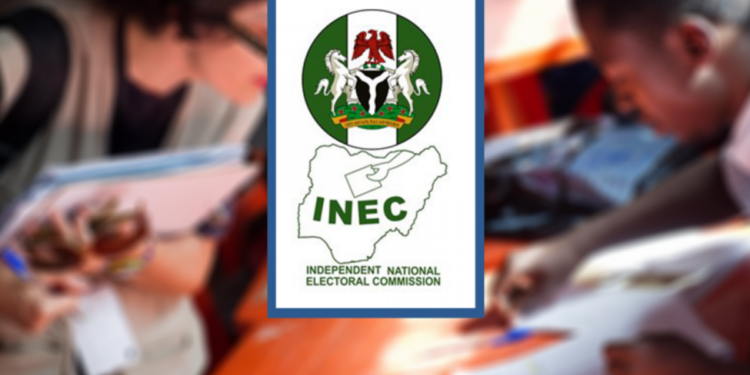Prominent voices within the Nigerian political space and leaders of civil society organisations (CSOs) have implored President Bola Ahmed Tinubu to exercise utmost discretion in appointing national commissioners for the Independent National Electoral Commission (INEC).
They emphasised the critical need for individuals with impeccable character and unwavering credibility to play these pivotal roles in ensuring free and fair elections in the country.
The concerned CSOs who spoke with LEADERSHIP in Abuja yesterday are Transparency International, Nigeria; Civil Society Legislative Advocacy Centre (CISLAC); Civil Liberties Organisation (CLO), and Make A Difference Initiative (MAD).
They jointly expressed concern about the appointment of national commissioners of Independent National Electoral Commission (INEC).
They stressed the importance of upholding the Constitution and maintaining the integrity of the electoral process.
LEADERSHIP reports that the tenure of the national commissioner and chairman of the Information and Voter Education Committee, Barr Festus Okoye, ended a few months back.
Okoye’s tenure, which began on July 25, 2018 as representative of the south-east geopolitical zone in the commission, came to an end on July 24, 2023. His appointment was not renewed by President Tinubu.
According to Section 155(1)(c) of the constitution, national commissioners of INEC hold a five-year tenure and are eligible for a second term of five years.
Also, Section 156 (1) (a) and the Third Schedule Part 1 of the 1999 Constitution, provides that a REC shall be a person of unquestionable integrity “and shall not be a member of any political party.” With this, the Senate should promptly reject nominees associated with any registered political party.
LEADERSHIP reports that INEC had filed charges against its Adamawa State Resident Electoral Commissioner (REC), Hudu Ari, accusing him of illegally declaring cooked-up results at the last Adamawa State governorship election on 16 April.
However, the controversy surrounding the Adamawa REC serves as a stark reminder of the consequences that can arise from less-than-credible appointments.
This particular REC faced allegations and legal proceedings, which raised questions about the fairness and transparency of electoral activities under his supervision.
To avoid such cases in the future, stakeholders are urging Tinubu to exercise due diligence in the selection process.
The leaders of the CSOs who spoke exclusively with LEADERSHIP urged President Tinubu to take a different path and appoint individuals with neutrality, independence and not affiliated to any political party.
Head of Transparency International, Nigeria, Auwal Rafsanjani, asserted that appointing corrupt politicians and APC card-carrying members as INEC National Commissioners would be contrary to the Constitution’s provisions.
Rafsanjani who doubles as the executive director of (CISLAC) urged President Bola Tinubu to demonstrate respect for the Constitution and uphold the confidence of Nigerians in INEC as an impartial umpire.
He stressed the necessity of preserving ethical values and the independence of the electoral body.
Rafsanjani stressed that INEC’s independence is paramount and should be safeguarded to ensure adherence to established rules.
He urged the president to select individuals with impeccable character who are not affiliated with any political party as INEC National Commissioners.
He emphasised the importance of appointees having a clean record without involvement in criminal activities or electoral violence.
This, he said, is essential for maintaining the integrity and credibility of Nigeria’s electoral processes.
On his part, the president, CLO, Igho Akeregha, appealed to President Tinubu, urging him to adhere to democratic principles and avoid appointing card-carrying members of political parties as national commissioners of the INEC.
Akeregha stated that both the law establishing INEC and the constitution clearly stipulate that the President cannot appoint individuals affiliated with any political party as INEC commissioners.
While acknowledging that the practice occurred during the tenure of former President Muhammadu Buhari, the CLO implored President Tinubu to take a different path and appoint individuals with neutrality and independence.
The CLO’s president stressed that their appeal does not seek to coerce the President but rather aims to encourage him to embrace democratic values.
He said President Tinubu has an opportunity to demonstrate quality leadership by appointing individuals who are committed to upholding democratic principles and delivering on the promises of democracy.
Akeregha further said the importance of the President staying within the bounds of the law, especially given his commitment to operating in accordance with the rule of law.
He said Nigerians are closely monitoring these developments, and the CLO expects President Tinubu to translate his promises into action and adhere to the principles of democracy.
Also, the executive director of MAD, Lemmy Ughegbe, highlighted the critical importance of maintaining the impartiality and non-partisanship of INEC by appointing commissioners who are not politically affiliated.
Ughegbe pointed to past instances where INEC’s integrity came into question, notably during the tenure of former President Muhammadu Buhari when Lauretta Onochie, a politically affiliated individual, was nominated as a national commissioner.
Ughegbe noted that appointing individuals who are card-carrying members of political parties to serve as national commissioners can significantly impact the credibility of INEC and the electoral process.
He stated that even if such commissioners do not take actions favouring their respective parties, the mere perception of bias can erode public trust.
Ughegbe concluded by urging President Bola Tinubu and his administration to prioritise integrity over political affiliations when selecting individuals to serve as commissioners.
He said the importance of ensuring that INEC remains an impartial and trustworthy institution, not just for the sake of the electoral body but also for the confidence of the Nigerian populace in the democratic process.
“The process of appointing a new INEC chairman and commissioners involves nomination by the president, ratification by the council of state, and confirmation by the Senate. The Senate also should ask critical questions,” he added.



